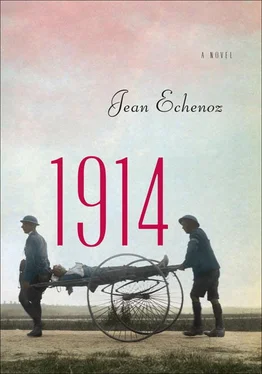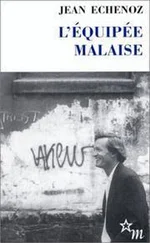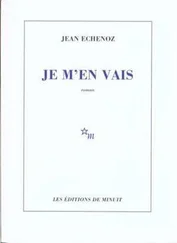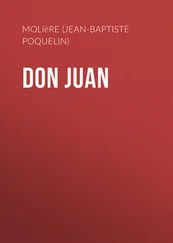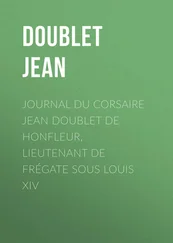Hmm, said Charles, that’s new. And you’re wearing it on your right hand, well, well. They’re usually worn on the left. I know, agreed Anthime, but it isn’t a question of style, it’s because my wrist hurts. Indeed, said Charles condescendingly, and it doesn’t bother you when you shake someone’s hand. I shake so few hands, observed Anthime, and as I told you, it’s for those pains I get in my right wrist, it relieves them. The ring’s a bit heavy but it seems to work. It’s a magnetic thing, if you like. Magnetic, repeated Charles with a trace of a smile, puffing a trace of a humph out his nose, shaking his head while shrugging one shoulder and looking away—and completing these five actions in a single second, leaving Anthime feeling once again humiliated.
So, began Anthime, trying to carry on by jerking his thumb toward a group waving signs, what do you think of this. It was inevitable, replied Charles, closing one of his cold eyes to clap the other one to his view-finder, but it won’t last longer than two weeks at the most. Of that, Anthime ventured to remark, I’m not so sure. Well, said Charles, tomorrow we’ll see.
AND THE NEXT MORNING, they all found themselves at the barracks. Anthime had arrived there quite early, having joined his fishing and café comrades along the way: Padioleau, Bossis, and Arcenel, that last mumbling complaints about celebrating the occasion too long into the wee hours the night before, stirring up hemorrhoids and a hangover. Padioleau, slightly built, a touch timid, thin-faced with a waxy complexion, had nothing of the sturdy presence of a butcher’s boy even though that was, in fact, his profession, whereas Bossis, not content with possessing the physique of a knacker, actually was one. As for Arcenel, he was a saddler, a craft that presupposes no particular habitus. In any case, each in his own way, these three took a great interest in animals, had seen lots of them, and were going to encounter a great many more.
Like all the first men to show up, they were rewarded with a uniform in their size, whereas Charles, eternally haughty and indifferent, arrived late enough that morning to earn himself an ill-fitting one at first, but when he protested disdainfully, fussing arrogantly over his position as a deputy plant manager, others— Bossis and Padioleau, as it turned out—were forced to give up some red trousers and a greatcoat that were apparently acceptable to such a leading citizen, despite his stoically disgusted expression. So Padioleau found himself utterly swamped by his reassigned greatcoat while Bossis never did manage, for as long as he had left to live, to get used to those pants.
Of medium height with an ordinary face, rarely smiling, sporting a mustache like just about all the men of his generation, twenty-three years old, wearing his new uniform with no more panache than he had in his everyday clothes, Anthime had intended to go speak to Charles: twenty-seven, no less poker-faced and mustached but more dashing, taller, more slender, turning his composed and icy gaze upon the world, apparently more bent than ever on remaining cool and distant, refusing to acknowledge anyone at all of lesser status, and doubtless Anthime in particular. Who therefore decided to forget it and rejoined his companions, if only to calm down Bossis, who was grumbling about his pants. Turning anyway to look back at Charles, Anthime saw him extract a cigar from a case he seemed about to slip back into his pocket but instead, pausing, he selected another cigar and offered it discreetly to the closest officer. Then Anthime watched him photograph that officer the way he had been photographing, for months now, everything he could get his hands on, perfecting his skills in that department to the point of having recently seen some of his pictures published in magazines like Le Miroir and L’Illustration , which accepted material from amateurs.
In the days that followed, everything moved fairly swiftly at the barracks. After the arrival of the last reservists, the territorials came in, nonprofessional soldiers organized on a local basis for home defense, old fellows between thirty-four and forty-nine years of age who were immediately called upon to stand drinks all around, and indeed, from Monday to Thursday those rounds came one after the other at a fast clip: by the end of the evening, everyone was somewhat the worse for wear. Then matters took a more serious turn when the squadrons were made up: Anthime found himself assigned to the 11th Squadron of the 10th Company, going up the chain to the 93rd Infantry Regiment, the 42nd Infantry Brigade, the 21st Infantry Division, and the 11th Army Corps of the 5th Army. Serial number 4221. The ammunition was distributed with the iron rations [3] Iron rations: For a full illustrated description of these iron rations, including the origins of the terms “bully beef” and “monkey meat,” Google “Vivres de Réserve—France’s Iron Ration in World War 1,” and select the site of that name. The Standard Reserve Food ration included two tins of corned beef, twelve hardtack biscuits, two packets of dried soup, two coffee tablets, and two envelopes of ration sugar.
—the emergency food supplies—and that evening, everyone again hit the bottle pretty hard. The next day was when they began to feel like soldiers: in the morning, the regiment drilled in formation for the first time, then passed in review before the colonel on the barracks square and paraded through the town that afternoon, since it was not yet time for them to leave on the troop train.
It was rather fun, that parade, with each man trying to walk tall in his uniform and look straight ahead. The 93rd marched along the avenue and then the main streets, lined by townspeople who weren’t stingy with their tossed flowers, cheers, and shouts of encouragement. Charles had of course wangled himself a spot in the front line of the procession; Anthime was in the middle of the regiment, grouped with Bossis, still ill at ease in his trousers, along with Arcenel, complaining constantly about his rear end, and Padioleau, whose mother had had time to take in the greatcoat at the shoulders and shorten the sleeves. As Anthime marched along trading muttered jokes with his pals, trying all the while to keep stepping out smartly, he thought he noticed Blanche on the left sidewalk of the avenue. At first he took her for a lookalike but then, no, it was she, Blanche, all dressed up in a lightweight pink skirt and summery mauve blouse. To protect herself from the sun she was sheltering under a big black umbrella while the troop was sweating along in cadence in their new kepis, quite tight at the temples, plus the knapsack strapped on according to regulations and which, that first day, did not weigh too heavily yet on the collarbones.
As he’d expected, Anthime had first seen Blanche smile proudly at Charles’s martial bearing and then, as he drew abreast of her in turn, he was not a little surprised when she gave him a different kind of smile, more serious and even, he felt, a trifle more emotional, pronounced, sustained, well who knows, exactly. He had neither seen nor tried to see how Charles—with his back to him, in any case—had reacted to her smile but he, Anthime, had responded only with a look, the shortest and longest one possible, forcing himself to invest it with the least amount of expression while at the same time suggesting the maximum: a novel approach, doubly paradoxical this time and which, as he strove to keep in step, was no small undertaking. After they’d filed past Blanche, Anthime preferred not to look at any more people.
At the station early the next morning, Blanche was there again, on the platform among the crowd waving little flags, as some boys chalked ON TO BERLIN on the flanks of the locomotive and a four- or five-man brass band did its best with the national anthem. Hats, scarves, bouquets, hankies, waved every which way as baskets of provisions passed through the train’s windows, hugs enveloped children and old folks, couples embraced, and tears fell on the railcar steps—as one can see today in Paris in Albert Herter’s vast mural in the Hall Alsace of the Gare de l’Est. [4] Albert Herter: The American painter Albert Herter lost a son in 1918, killed near Château-Thierry while fighting in the American Expeditionary Force commanded by General John “Black Jack” Pershing. In memory of his son, Herter gave Le Départ des poilus, août 1914 (The Departure of the Troops, August 1918) to France, where since 1926 it has hung in the Gare de l’Est. A fine image of this monumental painting may be seen by Googling “Le Départ des poilus, août 1914 | Clio-Photo” and selecting the site of the same name. Christian Herter, the painter’s other son, became governor of Massachusetts and later served as secretary of state under Dwight D. Eisenhower.
On the whole, however, people smiled confidently because it would all be over quickly, apparently, so everyone would be back soon—and from a distance, as Charles held Blanche in his arms, Anthime saw her gaze over his shoulder and once again direct that same look at him. Then it was time to get on the train and barely a week after his little bicycle excursion, after heading northeast from Nantes at six o’clock on Saturday morning, Anthime arrived up in the Ardennes on Monday in the late afternoon.
Читать дальше
